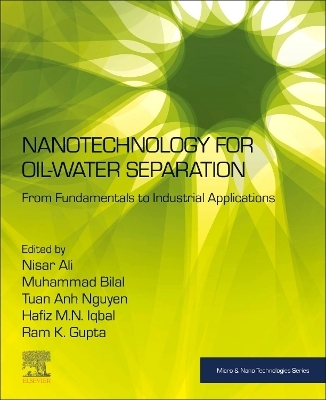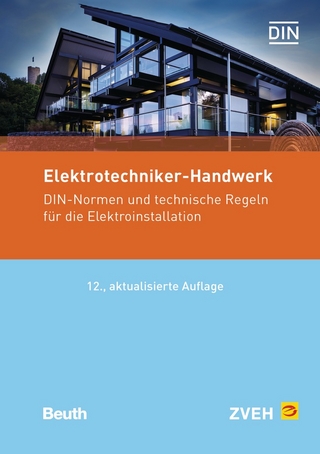
Nanotechnology for Oil-Water Separation
Elsevier - Health Sciences Division (Verlag)
978-0-323-95517-1 (ISBN)
The increasing amounts of industrial substances released by petrochemical, steel or gas-generating plants and food-processing factories into water poses an ever more serious environmental threat. Due to the significant adverse impact on the natural ecosystem, aquatic organisms and human health, the scientific community has made its priority to find sustainable methods to separate oil-water mixtures.
Dr. Nisar Ali has a PhD in Applied Chemistry and is currently working as an Associate Professor at the School of Chemical Engineering, Huaiyin Institute of Technology, China. He is also a researcher at the Laboratory of Theoretical and Computational Biophysics, Ton Duc Thang University, Ho Chi Minh City, Vietnam. He actively participates in research projects related to the synthesis of polymers and magnetic polymer composites that have special wettability properties and smart surfaces. Muhammad Bilal is an associate professor at the Department of Sanitary Engineering, Faculty of Civil and Environmental Engineering, Gdansk University of Technology, Gdansk, Poland. He has published more than 350 research papers in leading international journals and also serves as an Associate Editor for several of these journals. Hafiz M.N. Iqbal is a Research Professor in the School of Engineering and Sciences at the Tecnológico de Monterrey, Mexico. His areas of research are biomaterials, bioengineering, biomedical engineering, environmental engineering, bioremediation, bio-catalysis, enzymes, immobilization, chemical engineering, green chemistry, algal biotechnology, and bioenergy. Dr. Ram Gupta is an Associate Professor of Chemistry at Pittsburg State University. He is the Director of Research at the National Institute for Materials Advancement (NIMA). Dr. Gupta has been recently named by Stanford University as being among the top 2% of research scientists worldwide. Before joining Pittsburg State University, he worked as an Assistant Research Professor at Missouri State University, Springfield, MO then as a Senior Research Scientist at North Carolina A&T State University, Greensboro, NC. Dr. Gupta’s research spans a range of subjects critical to current and future societal needs including: semiconducting materials & devices, biopolymers, flame-retardant polymers, green energy production & storage using nanostructured materials & conducting polymers, electrocatalysts, optoelectronics & photovoltaics devices, organic-inorganic heterojunctions for sensors, nanomagnetism, biocompatible nanofibers for tissue regeneration, scaffold & antibacterial applications, and bio-degradable metallic implants. Tuan Anh Nguyen is Principal Research Scientist at the Institute for Tropical Technology, Vietnam Academy of Science and Technology, Hanoi, Vietnam. His research focuses on advanced nanomaterials and nanotechnology for corrosion and materials integrity in transportation systems. His research activities include smart coatings, conducting polymers, corrosion and protection of metals/concrete, antibacterial materials, and advanced nanomaterials.
1 Oil-water emulsion formationan overview 2 Environmental impact of nanomaterials 3 Principles of oil-water separation strategies 4 Nanotechnology for remediation of oilfield and refineries wastewater 5 Fiber membranes for oil/water separation 6 Carbon-based nanomaterials (graphene and graphene oxide, carbon nanotubes, and carbon nanofibers) for oil-water separation 7 Chitosan-based composites for oil-contaminated water treatment 8 Membrane-based hybrid materials for oil/water separation 9 Electrospun nanofibers-based membranes for oil-water treatment 10 Application of electrospun fibers for oil/water separation 11 Electrospun fibers: promising materials for oil water separation 12 Regeneration/reuse capability of monolithic carbon xerogels-metal nanocomposites for crude oil removal from oil-in-saltwater emulsions 13 Toxicity of nanomaterials used in oilwater separation 14 Overview of demulsification techniques in the petroleum industry 15 Nanomaterials: fundamentals and applications 16 Bio-based aerogel absorbents for oil-water separation 17 Applications of superwettable materials for oil and water separation 18 The role of redox agents in oilwater separation 19 Magnetic polymer hybrid substances for water/oil separation 20 Bio-adsorbents for water-oil separation
| Erscheinungsdatum | 05.09.2023 |
|---|---|
| Reihe/Serie | Micro & Nano Technologies |
| Verlagsort | Philadelphia |
| Sprache | englisch |
| Maße | 191 x 235 mm |
| Gewicht | 1220 g |
| Themenwelt | Technik ► Elektrotechnik / Energietechnik |
| Technik ► Maschinenbau | |
| Technik ► Umwelttechnik / Biotechnologie | |
| ISBN-10 | 0-323-95517-7 / 0323955177 |
| ISBN-13 | 978-0-323-95517-1 / 9780323955171 |
| Zustand | Neuware |
| Haben Sie eine Frage zum Produkt? |
aus dem Bereich


